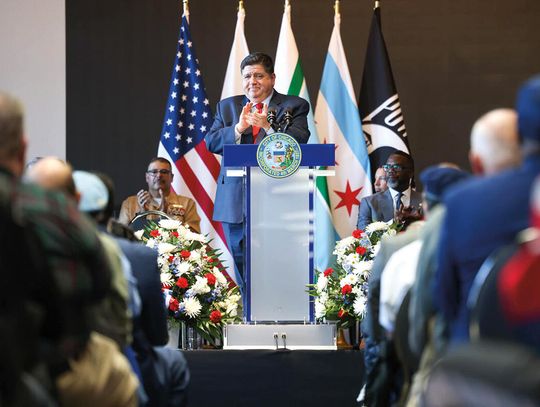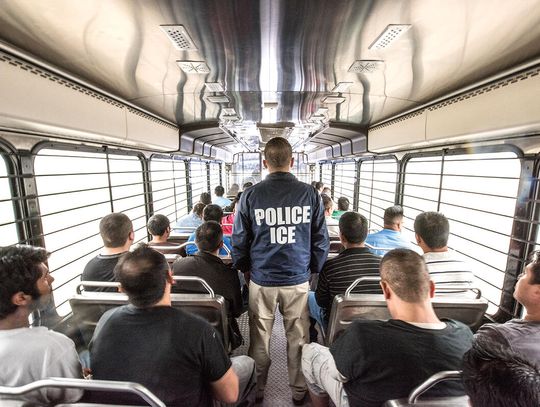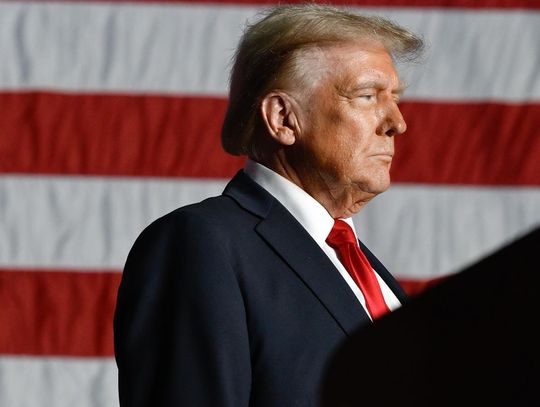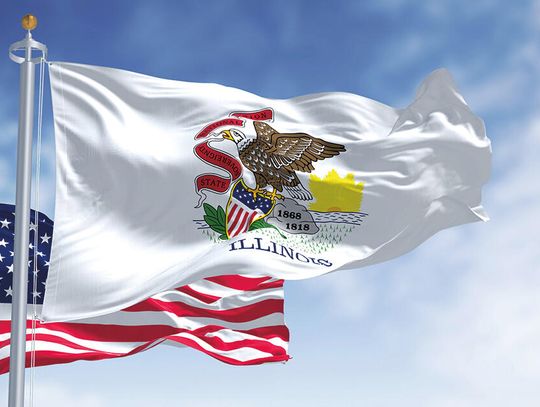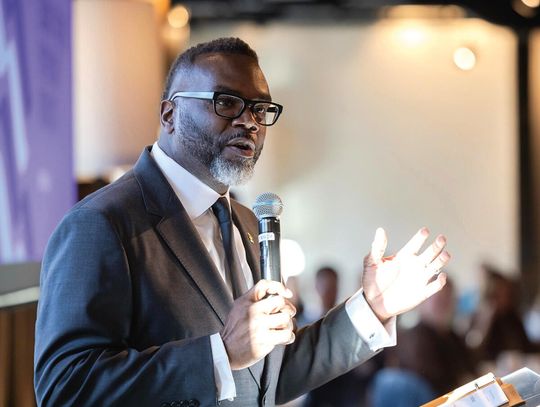The Warsaw Institute Foundation to pierwszy polski geopolityczny think tank w Stanach Zjednoczonych. Strategicznym celem tej organizacji jest wzmocnienie polskich interesów w USA przy jednoczesnym wspieraniu unikalnego sojuszu między dwoma narodami. Jej działalność koncentruje się na takich zagadnieniach jak geopolityka, porządek międzynarodowy, polityka historyczna, energetyka i bezpieczeństwo militarne. The Warsaw Institute Foundation została założona w 2018 roku i jest niezależną organizacją non-profit, inspirowaną bliźniaczą organizacją działającą w Polsce – Warsaw Institute. The Warsaw Institute Foundation is Poland's first geopolitical think tank in the United States. The strategic goal of this organisation is to bolster Polish interests in the U.S. while supporting the unique alliance between the two nations. Its activity focuses on such issues as geopolitics, international order, historical policy, energy, and military security. Established in 2018, The Warsaw Institute Foundation is an independent, non-profit organization inspired the twin Poland-based Warsaw Institute.
Międzynarodowy Fundusz Walutowy w Bośni i Hercegowinie – nowe wsparcie akcentuje utarte podziały
- 06/19/2020 07:32 PM
Ekstremalne sytuacje wywołane szerzeniem się choroby COVID-19 wyniosły na powierzchnię głęboko zakorzenione problemy strukturalne wielu narodów, uwidoczniły tendencje polityczne sprawujących władzę oraz spotęgowały wewnętrzne konflikty rozlicznych społeczeństw. Wyjątku od tej zasady nie stanowi Bośnia i Hercegowina (BiH). W kraju tym po raz kolejny rozbrzmiały wieści o aferach korupcyjnych, tragicznych niedoborach służby zdrowia czy słabościach systemu zabezpieczeń socjalnych. Niechlubnym zjawiskiem wyróżniającym BiH był natomiast ponad miesięczny konflikt uniemożliwiający użycie kredytu przyznanego państwu przez Międzynarodowy Fundusz Walutowy (MFW) – środków, wydawać by się mogło, niezbędnych do ratowania wstrząśniętej kryzysem gospodarki.
Bośnia i Hercegowina jest jednym z pięciu państw, obok Albanii, Macedonii Północnej, Mołdawii i Kosowa, które w ramach Instrumentu Szybkiego Finansowania (RFI) wsparte zostały kredytem przeznaczonym na pomoc służbie zdrowia i łagodzenia ekonomicznych konsekwencji nadzwyczajnej sytuacji wywołanej pandemią nowego koronawirusa. Opiewające na 330 mln euro dofinansowanie opatrzono korzystnym oprocentowaniem (1.05%) oraz okresem karencji wynoszącym 39 miesięcy. Wysokość przyznanej kwoty czyni z BiH największego beneficjenta spośród wymienionych państw programu.
Zapowiedź przyszłych problemów związanych z kredytem wystąpiła już na etapie formułowania listu intencyjnego, niezbędnego przy wnioskowaniu o pomoc MFW. Politycy wywodzący się z Chorwackiej Wspólnoty Demokratycznej BiH (HDZ BiH) blokowali jego wysłanie, naciskając na bezprecedensowe ujęcie kantonów (silnie autonomicznych jednostek administracyjnych Federacji BiH) na równi z tradycyjnie występującymi w tego typu dokumentach Federacją Bośni i Hercegowiny, Republiką Serbską oraz Dystryktem Brczko. Kompromis osiągnięto 11 kwietnia, gdy przy asyście delegacji Unii Europejskiej, przedstawicieli MFW oraz ambasadora USA – Erica Nelsona, liderzy trzech największych partii uzgodnili podział środków, wedle którego Federacji BiH przypadło w udziale 62% kwoty, a Republice Serbskiej – 38%. Najmniejszemu, Dystryktowi Brczko, przeznaczone zostało po połowie procenta z sum przyznanych większym podmiotom. Kantony ujęto ostatecznie jako części składowe Federacji.
Podstawą administracyjno-terytorialnej organizacji Bośni i Hercegowiny jest układ pokojowy z Dayton oraz będąca jego częścią konstytucja kraju. Dokument, kończący trwającą od 1992 do 1995 roku wojnę, podzielił państwo na Republikę Serbską oraz Federację Bośni i Hercegowiny. Pierwszy z nich wyróżnia się relatywnie homogeniczną narodowo ludnością (82% populacji stanowią Serbowie) oraz wysokim stopniem centralizacji. Federację BiH, utworzoną w 1994 r. w celu zakończenia walk pomiędzy siłami chorwackimi i boszniackimi (bośniaccy muzułmanie), podzielono natomiast dodatkowo na dziesięć kantonów. Każdy z nich posiada swój parlament, rząd oraz szereg autonomicznych kompetencji. Federację zamieszkują przede wszystkim Boszniacy (70%) oraz Chorwaci (22%). Osobną jednostką administracyjną jest istniejący od 2000 roku Dystrykt Brczko, stanowiący mniej niż 1% powierzchni państwa. Niezwykle złożony system polityczny jest źródłem nieprzemijających napięć, a rozbudowana i kosztowna administracja skutecznie blokuje rozwój kraju i tworzy podatny grunt dla korupcji na wszystkich szczeblach władzy.
23 kwietnia, po akceptacji zarządu Międzynarodowego Funduszu Walutowego, przedmiotowe 330 mln euro trafiło na konto Banku Centralnego BiH. Zgodnie z przyjętą procedurą, by instytucja ta mogła przekazać je odpowiednim ministerstwom, konieczne było dostarczenie specjalnej decyzji Rady Ministrów BiH. Pomimo wcześniej ustalonych w liście intencyjnym zasad i sformułowań, Vjekoslav Bevanda, federalny Minister Finansów, nadal naciskał na wyniesienie kantonów do rangi równej pozostałym częściom składowym BIH.
Konfliktem leżącym u podstaw trwającego ponad miesiąc patu jest rozbieżna wizja ustroju państwa dwóch najważniejszych partii Federacji – boszniackiej Partii Akcji Demokratycznej (SDA) i chorwackiej HDZ BiH. Pierwsza, z racji liczebności swej politycznej bazy, opowiada się za unitaryzmem i przenoszeniem kompetencji na najwyższy – państwowy – poziom władzy. W Deklaracji programowej przyjętej podczas zjazdu partii we wrześniu 2019 r. podkreślono chęć dążenia do utworzenia Republiki Bośni i Hercegowiny – nazwa ta funkcjonowała w trakcie wojny po secesji z Socjalistycznej Federacyjnej Republiki Jugosławii. Dopiero kończący walki układ pokojowy przemianował kraj na Bośnię i Hercegowinę, termin akceptowany przez wszystkie strony ówczesnego konfliktu. W programie partii znalazł się również punkt przewidujący rezygnację z obecnego Prezydium (trzech prezydentów reprezentujących trzy konstytutywne narody BiH) i powołanie jednoosobowej funkcji prezydenta. SDA sprzeciwia się także nowym podziałom administracyjnym oraz popiera reformy konstytucyjne, które centralizowałyby ustrój i procesy decyzyjne wewnątrz kraju. Z drugiej strony, najsilniejsza partia bośniackich Chorwatów forsuje ideę utworzenia trzeciego podmiotu, na który miałyby się złożyć regiony zamieszkane w większości przez ten właśnie naród. To temu celowi służyć miało niespotykane wcześniej ujęcie kantonów w umowie z MFW. Nadałoby im to międzynarodową podmiotowość i mogło w przyszłości legitymizować dążenia Dragana Čovića, przewodniczącego HDZ BiH. Według ostatniego spisu powszechnego Chorwaci stanowią 15% populacji Bośni i Hercegowiny. Partia D. Čovića sprawuje obecnie władzę w trzech kantonach – Posawskim, Zachodniohercegowińskim i Kantonie 10., w których to zdecydowaną większość mieszkańców stanowią Chorwaci. W kantonie hercegowińsko-naretwiańskim HDZ BiH współdzieli władzę z SDA, co odzwierciedla skład populacji tego regionu – 53% Chorwatów oraz 41% Boszniaków. Drugim najważniejszym postulatem partii jest zmiana sposobu wyboru głów państwa. Obecnie w Prezydium BiH zasiadają przedstawiciele trzech narodów, przy których wyborze przynależność etniczna głosującego nie jest brana pod uwagę. Celem HDZ BiH jest zasada, według której każdy naród wybierać będzie swojego przedstawiciela. Nowej dynamiki tym wymogom nadał wybór Željka Komšića, którego, zdaniem D. Čovića, na przedstawiciela Chorwatów wybrał elektorat boszniacki. W dążeniach do jeszcze ściślejszej decentralizacji i umocnieniu etnicznych podziałów wewnątrz państwa Chorwat sprzymierzył się z Miloradem Dodikiem, serbskim członkiem Prezydium BiH. Fundamentem jego politycznej strategii jest zabieganie o przenoszenie kompetencji państwowych na poziom Republiki Serbskiej, którą jego partia, Sojusz Niezależnych Socjaldemokratów (SNSD), rządzi od lat.
Charakter gospodarek kantonów rządzonych przez HDZ BiH, silnie uzależnionych od pozbawionej obecnie dochodów turystyki, skłonił V. Bevandę do rezygnacji z wcześniej wymaganego zapisu i uwolnienia funduszy. W decyzji dostarczonej 3 czerwca Bankowi Centralnemu BiH kantony zostały przedstawione jako integralna część Federacji. Formalne uniknięcie ich wyodrębnienia nastąpiło po przyjęciu przez Parlament Federacji BiH poprawki budżetu na rok 2020, wedle której 50% środków kredytowych przypadnie kantonom. Za spłatę całej sumy będzie natomiast odpowiedzialny wyłącznie rząd Federacji. Sprzyjającą Chorwatom zmianę budżetu przyjęto już 28 kwietnia, co wskazuje na wagę, jaką przypisują oni budowie formalnej podstawy swojej politycznej agendy.
Wstrzymywanie potrzebnych środków, poza natychmiastowymi negatywnymi konsekwencjami dla gospodarki i społeczeństwa państwa, wysyła niepokojący sygnał szeroko rozumianej społeczności międzynarodowej. Wsparcie podmiotów międzynarodowych nadal stanowi istotny element finansów Bośni i Hercegowiny. Zdaniem Andrew Jewella, przedstawiciela MFW w BiH, aktualna blokada pomocy finansowej może mieć wpływ na przyszłe decyzje organizacji odnoszące się do współpracy z krajem. Sytuacja ta nie ułatwia również konstrukcji atrakcyjnego profilu inwestycyjnego państwa, w którym tak bardzo owych inwestycji brakuje.
Jakub Bawołek
Absolwent studiów magisterskich w zakresie bezpieczeństwa międzynarodowego na Uniwersytecie Wrocławskim. Doświadczenie zawodowe zdobywał w mediach, Ambasadzie RP w Sarajewie oraz Kancelarii Senatu RP.
The Warsaw Institute Foundation to pierwszy polski geopolityczny think tank w Stanach Zjednoczonych. Strategicznym celem tej organizacji jest wzmocnienie polskich interesów w USA przy jednoczesnym wspieraniu unikalnego sojuszu między dwoma narodami. Jej działalność koncentruje się na takich zagadnieniach jak geopolityka, porządek międzynarodowy, polityka historyczna, energetyka i bezpieczeństwo militarne. The Warsaw Institute Foundation została założona w 2018 roku i jest niezależną organizacją non-profit, inspirowaną bliźniaczą organizacją działającą w Polsce – Warsaw Institute. The Warsaw Institute Foundation is Poland's first geopolitical think tank in the United States. The strategic goal of this organisation is to bolster Polish interests in the U.S. while supporting the unique alliance between the two nations. Its activity focuses on such issues as geopolitics, international order, historical policy, energy, and military security. Established in 2018, The Warsaw Institute Foundation is an independent, non-profit organization inspired the twin Poland-based Warsaw Institute.
The Warsaw Institute Foundation to pierwszy polski geopolityczny think tank w Stanach Zjednoczonych. Strategicznym celem tej organizacji jest wzmocnienie polskich interesów w USA przy jednoczesnym wspieraniu unikalnego sojuszu między dwoma narodami. Jej działalność koncentruje się na takich zagadnieniach jak geopolityka, porządek międzynarodowy, polityka historyczna, energetyka i bezpieczeństwo militarne. The Warsaw Institute Foundation została założona w 2018 roku i jest niezależną organizacją non-profit, inspirowaną bliźniaczą organizacją działającą w Polsce – Warsaw Institute. The Warsaw Institute Foundation is Poland's first geopolitical think tank in the United States. The strategic goal of this organisation is to bolster Polish interests in the U.S. while supporting the unique alliance between the two nations. Its activity focuses on such issues as geopolitics, international order, historical policy, energy, and military security. Established in 2018, The Warsaw Institute Foundation is an independent, non-profit organization inspired the twin Poland-based Warsaw Institute.
Reklama





